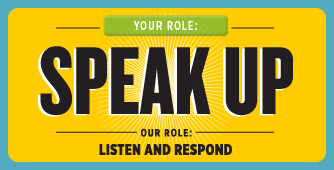 UCF Compliance & Ethics Newsletter
UCF Compliance & Ethics Newsletter
Reporting Misconduct and Protection from Retaliation
If you are not familiar with the UCF policy on reporting misconduct and protection from retaliation, we encourage you to read the full policy, available at Reporting Misconduct and Protection from Retaliation. This policy declares UCF’s commitment to a culture of integrity, compliance, and accountability that encourages the highest standards of ethical behavior. Members of the university community are expected to conduct all university activities and business in an honest, ethical, and lawful manner. When members of the university community become aware of or have reason to suspect university activities and business are not being properly conducted, UCF expects and encourages them to make good-faith reports of suspected misconduct. This policy includes protection from retaliation for anyone who, in good faith, reports misconduct, or who participates in an investigation on misconduct.
Reports and Investigations
UCF provides multiple resources for reporting suspected misconduct, clarifying a situation, or asking a question. We encourage you to use these resources.
1.Supervisors
An employee’s supervisor, or appropriate college, department, or unit administrator, are usually most familiar with the issues and personnel involved and, therefore, may be best suited to address a concern. Supervisors receiving reports of potential fraud should contact University Audit for guidance and investigation.
2. Central Offices
In some cases, an employee may feel uncomfortable raising a report of misconduct at the college or department or other similar administrative unit level due to the nature of the subject matter or because of other legitimate considerations that suggest an alternative reporting process may be more appropriate. In such cases, the employee may report through a central university office having specialized expertise relating to the concern, such as:
- Office of the Provost (noncompliance with academic regulations)
- Human Resources (A&P, USPS, and OPS employee relations issues)
- Office of Faculty Excellence (faculty, including adjunct faculty noncompliance)
- University Audit (potential fraud and internal control issues)
- Athletics Compliance (NCAA violations)
- Research Ethics and Compliance (falsification, fabrication, plagiarism in research)
- Office of Equal Opportunity and Affirmative Action Programs, Title IX coordinator (discrimination, sexual harassment)
3. University Compliance, Ethics, and Risk Office
Employees reluctant to report suspected misconduct directly to their supervisors or through university administrative or central offices are encouraged to use the UCF IntegrityLine. The UCF IntegrityLine is administered by a third-party vendor, NAVEX Global, and offers employees the option to report anonymously. IntegrityLine reports will be processed by EthicsPoint and sent to University Compliance, Ethics, and Risk to address appropriately.
4. UCF IntegrityLine
Employees may also report suspected misconduct by contacting University Compliance, Ethics, and Risk directly by calling the chief compliance and ethics officer at 407-823-6263, by email to complianceandethics@ucf.edu, by mail to 4365 Andromeda Loop N., MH 328, Orlando, Florida, 32816.
UCF takes reports of misconduct very seriously, and investigations will be conducted by the appropriate university office as applicable. Depending on the nature of the allegation, investigations may be conducted by University Compliance, Ethics, and Risk, University Audit, or the office of Equal Opportunity and Affirmative Action Programs. These offices are trained to investigate issues while maintaining as much confidentiality as possible. It is important to let them do their job, and not try to find out more about who made the complaint or why. If an investigator interviews you, be sure to keep confidences. Do not talk to others about the situation, including other employees or anyone outside the university.
Understanding Retaliation
There are forms of retaliation that we all immediately recognize and know are wrong. These include job loss, demotion, transfers, poor performance reviews without cause, low pay increases, and public attacks on the character of someone who has made a report. This kind of retaliation is clearly against our university policy and is not tolerated here.
Most people would never intentionally retaliate against a co-worker who reported wrongdoing. Both supervisors and employees know that reports help our university, and that even bad news can help us make improvements that benefit us in the long run. But normal, human emotions can sometimes override our intellectual understanding, especially in difficult or uncomfortable situations. Each of us needs to be very aware that our words and attitudes can send subtle signals that can feel as much like retaliation as more blatant acts.
“We used to have lunch every week, but since I reported my concerns, my supervisor never asks me to join her.”
“When I walk into a room, the laughter stops. They must think I lost my sense of humor when I filed that report.”
“Getting information around here is like pulling teeth. Nobody tells me anything anymore.”
“Last week I made an excellent suggestion and my supervisor totally ignored it. She used to listen to me, but not now.”
Subtle Retaliation
There is another, more subtle form of retaliation that may happen when reports are made. What are signs of subtle retaliation? Perhaps even without realizing it:
- Information is withheld from the person who made the report – perhaps to keep him or her from pointing out something else that is wrong.
- The reporter is not included in social events.
- His or her suggestions are ignored.
- Co-workers and supervisors use body language to create distance, or allow anger to come out as sarcasm or jokes.
These actions send a powerful message and make employees reluctant to report problems.
Whether you are a supervisor or employee, your actions matter. It is important to be aware of any subtle messages you may be sending whenever an issue is raised. Tone of voice and body language can convey more than your words. Looking away as a person approaches, sitting with arms folded, turning away from them in meetings, sending other people a disapproving look behind the person’s back – all of these may be interpreted as retaliation, which is against our policy and may lead to negative consequences including fines or loss of your job.
Remember that your intention has nothing to do with how your actions are perceived. Although you might not intend to retaliate, the other person may perceive your words or actions that way. Each of us must take steps to keep our own emotions in check and avoid the dangers of subtle retaliation.
Questions and Answers
“I just found out that one of my co-workers made a complaint to University Compliance, Ethics, and Risk. I want to know who it was because I think I can help resolve the problem. Since I only want to help, can I ask University Compliance, Ethics, and Risk (UCER) to give me this information?”
No, but you should contact UCER and tell them what you know about the situation. UCER is committed to preserving the confidentiality of the reporter in any way that does not impede the investigation. They will not provide this information to anyone who does not need to know it in order for the investigation to proceed.
“During an investigation, one of my co-workers retaliated against the person who made the complaint. If the person files retaliation charges, who may be held responsible for this behavior?”
The person who retaliated, his or her supervisor, and the university may all be held liable. All employees must understand our non-retaliation policies. If there is a retaliation claim, both the supervisor and the retaliating employee may be subject to fines or disciplinary measures. If you are aware of possible retaliation, you should contact the UCF IntegrityLine or UCER with the information that you know.
“I made a report to UCER a few months ago. The issue was resolved, but I just had my performance review and my manager made a number of suggestions for improvement. I feel singled out. What can I do?”
Performance reviews should be honest assessments of your performance and may legitimately include suggestions for improvement. Consider your supervisor’s suggestions in this light, and don’t assume they are a result of your earlier report. If you feel that your performance evaluation was biased, speak to UCER or to Human Resources.
“I have had issues with one of my co-workers. Since I talked to my supervisor about the situation, my co-worker seems distant and cool with me and others in our area. What can I do?”
Try your best to model excellent behavior by not reacting to your co-worker’s cold shoulder. Involve everyone equally and be a good team member. Hopefully, your example will lead the way for all of your co-workers. If any attitude over your report becomes an issue for work performance, bring it to your supervisor’s attention (or to Human Resources) so that he or she can resolve it.


